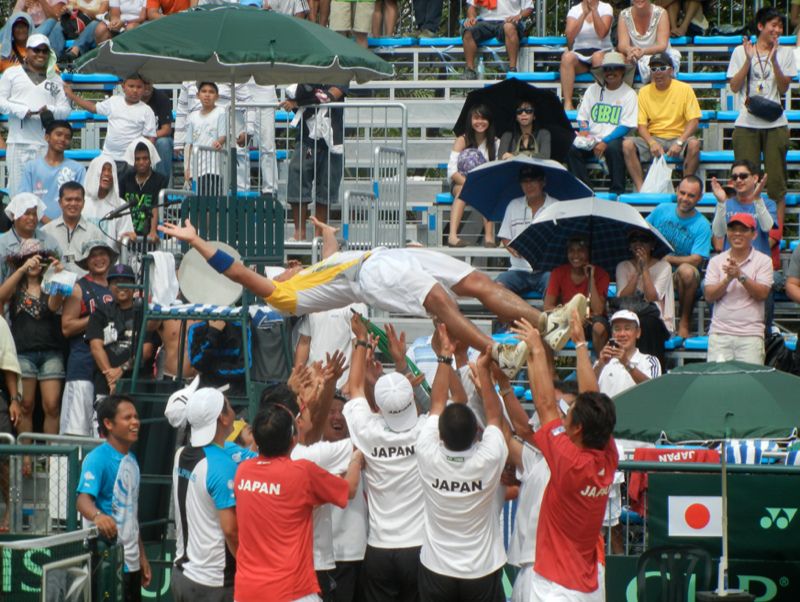What the Azkals can learn from Cecil Mamiit
I first heard of the contract the Philippine national team management wanted with its players, and I have to admit, it's kinda weird because I think the Philippines is the only country that have its national team members under contract.
And it’s this contract that apparently has resulted to the Younghusband issue. The brothers didn't sign the contract, but instead, had a counteroffer of their own for the PFF, an offer, which Ebong Joson has diplomatically described as loaded with "economic and non-economic demands."
As contract negotiations go, the one shelling out the money usually makes a low offer, while the one getting hired shoots for the moon and both parties are hoping they'd meet in the middle.
But is the Azkals-management contract about the money or about commitment? And by putting a monetary value on the contract, did team management open the way for players like Phil and James to demand more? Why do they think they are entitled to more than what the rest are getting and had they gotten what they wanted, would that have meant that they'd attend more sessions, more games, more camps than the rest?
You know what? I think Coach Michael Weiss came out the winner in this controversy. Based on what was revealed in the press con, he came out as fair but firm--giving the brothers all the chances they wanted before finally deciding, enough is enough.
It may be about the contracts for the brothers and for the PFF, but for the German coach, it was about the two brothers' fitness levels and their need to catch up.
There's another element in the controversy that was touched on by the PFF statement. The PFF said, "The Suzuki Cup also drastically changed the lives of our national players: from being virtual unknowns in 2010, the Azkals are now recognized as local sports icons, peace ambassadors and even product endorsers!"
It's a soft reminder that without the Suzuki Cup success, the players would be left holding promo camps in places like the USC high school field, going incognito to places like Jaguar. You could say, too, that without the players, the Suzuki Cup success would have been impossible, but that's a dangerous notion--when one player begins to think he's bigger than the team, that's when the shit hits the ceiling.
There are lessons to be learned from this sorry episode--1.) the Younghusbands are not untouchables, 2.) some players don't understand what the contract is about. (And 3. Bandera knows squat about football as it tweeted in Tagalog, "The Younghusband brothers will play for the UK, not the Philippines, in the Peace Cup)
4.) Decisions on lineup is precisely just that, a coach's decision. There were a lot of speculations on why the two were excluded, politics primarily among them. One former player said that if you're not at their beck and call, you're out. They being Dan Palami and coach Weiss. And it turns out it wasn't about that. This was about a coach finalizing his lineup based on who he thinks should be on it. Whether he's right or not, it's all on him.
On the positive side of things, I'm glad that this happened now, and not a week or two before the Suzuki Cup, there's enough time to mend the fences, enough time, too, to clarify what these contracts are all about.
And you have to commend both sides for being diplomatic about this testy issue that has some fans--both serious and bandwagons--picking sides and throwing a barb or two. It's kinda like a lovers quarrel, where both parties, when asked by friends, are unwilling to dish out anything dirty, hence opening the way for getting back again.
As for the fans who are abandoning the national team because their favorite players are off it? And for team management and players discussing contracts?
Let me tell you a story about one player, who was quite old, but still got the "starting spot." He said that it didn't matter whether he'd get to play or if his role would be limited to carrying other players' bags.
"It's about the team. We're all willing to do anything for the team."
Then that dude, the oldest in the squad at 35 went to play a roller-coaster of a five-setter over six hours against 23-year-old Tatsumi Ito, who was 567 places higher than him in the rankings. At one point, Mamiit was three points away from losing, but managed to fight back and even got to a couple points away from victory.
But he lost. And he apologized to the fans—even if he didn’t have to. Two days later, puking from exhaustion and cramps, he was giving it all again. He fought so hard that when it was all over, it wasn’t the Pinoys who hoisted him in the air, but the Japanese team, who were so impressed with his fighting spirit.
If you focus your attention on one player, instead of the team, sometimes you’d miss why your favorite players joined the team in the first place. It’s for moment like that, when you give your all for the country.
Cecil Mamiit taught us that.
And one more thing about Cecil?
At his prime, he was the subject of a ridiculous smear campaign when tennis officials said he was asking $50,000 before he’d play for the flag. But this guy has shown over and over again he’s not only willing to play for free, he’d give life and limb on the court, for the flag. Every-freakin-time!
No contract ever made him do that.
During one of the press conferences for the tie against Japan, Cecil said, they were hoping Philippine tennis would have an Azkal moment, to gain new fans and get the sport off the ground.
You know what? I think it’s time the Azkals have a Cecil Mamiit moment.
(Here's a photo of that moment, taken by John Pages www.pages.ph)

Comments